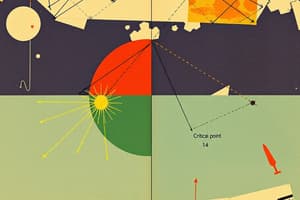Podcast
Questions and Answers
Which term refers to a form of matter that is uniform throughout in chemical composition and physical state?
Which term refers to a form of matter that is uniform throughout in chemical composition and physical state?
- Phase (correct)
- Phase transition
- Metastable phase
- Phase boundary
What is the term for the temperature at which two phases are in equilibrium and the Gibbs energy is minimized at the prevailing pressure?
What is the term for the temperature at which two phases are in equilibrium and the Gibbs energy is minimized at the prevailing pressure?
- Thermodynamic temperature
- Equilibrium temperature
- Transition temperature (correct)
- Phase stability temperature
What does a phase diagram show?
What does a phase diagram show?
- Chemical reactions of a substance
- Vapour pressure variation with temperature
- Melting point variation with pressure
- Physical changes of state that a substance can undergo (correct)
What are metastable phases?
What are metastable phases?
What do phase boundaries on a phase diagram represent?
What do phase boundaries on a phase diagram represent?
What does a phase diagram map?
What does a phase diagram map?
Which temperature is at the point where the surface disappears and a single uniform phase called a supercritical fluid appears?
Which temperature is at the point where the surface disappears and a single uniform phase called a supercritical fluid appears?
What is the pressure at the critical temperature known as?
What is the pressure at the critical temperature known as?
At what pressure is the standard boiling point of a liquid slightly lower than its normal boiling point?
At what pressure is the standard boiling point of a liquid slightly lower than its normal boiling point?
What does the positive slope of the solid-liquid boundary in carbon dioxide indicate?
What does the positive slope of the solid-liquid boundary in carbon dioxide indicate?
At what triple point condition do three different phases of a substance (typically solid, liquid, and vapor) coexist in equilibrium?
At what triple point condition do three different phases of a substance (typically solid, liquid, and vapor) coexist in equilibrium?
At what pressure does the liquid phase of carbon dioxide sublimate regardless of the temperature?
At what pressure does the liquid phase of carbon dioxide sublimate regardless of the temperature?
What is the temperature at which the vapor pressure of a liquid is equal to the external pressure known as?
What is the temperature at which the vapor pressure of a liquid is equal to the external pressure known as?
What occurs at no other combination of pressure and temperature?
What occurs at no other combination of pressure and temperature?
What is the characteristic behavior indicated by the positive slope of the solid-liquid boundary in carbon dioxide?
What is the characteristic behavior indicated by the positive slope of the solid-liquid boundary in carbon dioxide?
At what pressure is it necessary to exert to obtain liquid carbon dioxide at any temperature?
At what pressure is it necessary to exert to obtain liquid carbon dioxide at any temperature?
Flashcards are hidden until you start studying
Study Notes
Terms and Definitions
- A homogeneous substance is a form of matter that is uniform in chemical composition and physical state.
- The Gibbs energy is minimized and in equilibrium at the temperature where two phases co-exist, known as the phase equilibrium temperature.
Phase Diagrams
- A phase diagram visually represents the different phases of a substance under varying temperature and pressure conditions.
- Metastable phases are states that are stable under certain conditions, but not in the lowest energy state possible.
- Phase boundaries on a phase diagram indicate the conditions (temperature and pressure) at which two phases coexist.
Additional Concepts
- A phase diagram maps the stability of phases under different temperature and pressure conditions.
- Supercritical fluid occurs at the critical temperature, where the distinction between liquid and gas phases disappears.
- The critical pressure is the pressure exerted at the critical temperature.
Boiling Points and Pressure Conditions
- At a lower pressure than the normal boiling point, the standard boiling point for a liquid is slightly lower.
- The positive slope of the solid-liquid boundary in carbon dioxide signifies that solid CO2 (dry ice) converts to liquid under increased pressure.
Triple Points and Sublimation
- At the triple point condition, solid, liquid, and vapor phases coexist in equilibrium.
- The liquid phase of carbon dioxide sublimates at any temperature under a pressure lower than its triple point pressure.
Vapor Pressure and Temperature Relations
- The temperature at which vapor pressure equals external pressure is known as the boiling point.
- Unique phase behavior occurs at no other combination of pressure and temperature, indicating specific stability conditions.
Pressure Conditions for CO2
- To obtain liquid carbon dioxide at any temperature, a pressure greater than the triple point pressure is necessary.
Studying That Suits You
Use AI to generate personalized quizzes and flashcards to suit your learning preferences.




